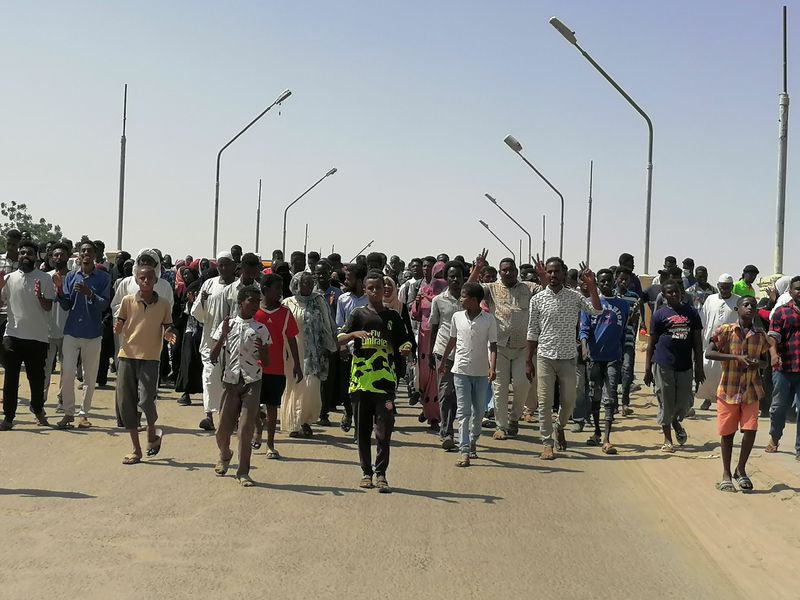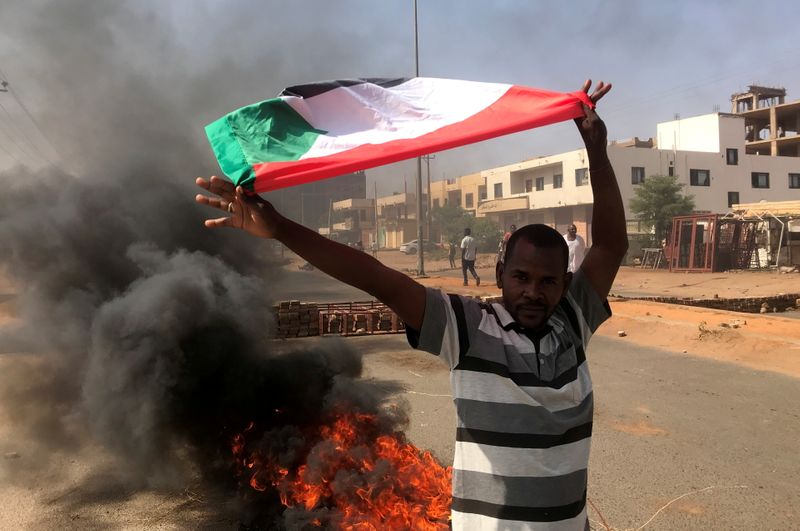By Khalid Abdelaziz
KHARTOUM (Reuters) -The World Bank halted disbursements for operations in Sudan on Wednesday in response to the military's seizure of power from a transitional government, while state oil company workers, doctors and pilots joined civilian groups opposing the takeover.
Thousands of people have taken to the streets since Monday's coup led by armed forces chief General Abdel Fattah al-Burhan, and several have been killed in clashes with security forces.
Burhan has dismissed the joint civilian-military council set up to steer the country to democratic elections following the overthrow of autocrat Omar al-Bashir in a popular uprising in April 2019.
He said he acted to stop the country slipping into civil war, but the World Bank decision to pause payments and stop processing new operations is a setback to his plans for one of Africa's poorest countries.
After isolation from the international financing system across three decades of Bashir's rule, Sudan achieved full re-engagement with the bank in March and gained access to $2 billion in financing.
"I am greatly concerned by recent events in Sudan, and I fear the dramatic impact this can have on the country’s social and economic recovery and development," World Bank President David Malpass said in a statement from Washington.
Abdalla Hamdok, prime minister in the deposed transitional government, had touted World Bank re-engagement as a major accomplishment and was depending on the funding for several large development projects.
The government had instituted harsh economic reforms that succeeded in achieving rapid arrears clearance and debt relief and renewed financing from the World Bank and IMF.
An IMF spokeswoman said the fund was monitoring developments but it was "premature" to comment.
Hamdok, who was detained on Monday and is under guard at his home, was in good health when visited by envoys from France, Germany, Norway, the UK, the United States, the European Union and the United Nations, the U.N. mission in Sudan said on Twitter (NYSE:TWTR) on Wednesday. The West has called for restoration of the council and the release of civilian leaders.
Hamdok says any retreat from the path to democracy threatens stability and development in Sudan and he warns against the use of violence against protesters, a source close to him said.
Late on Wednesday, Sudan state TV reported that Burhan had relieved six Sudanese ambassadors from their posts, apparently because they rejected the military takeover. The six were envoys to the United States, the European Union, China, Qatar, France and the head of mission to Geneva.
MARCH OF MILLIONS
Scattered protests took place in Khartoum on Wednesday and intensified at night across the capital, although no new bloodshed was reported.
In one Khartoum neighbourhood, a Reuters journalist saw soldiers and armed people in civilian clothes removing barricades erected by protesters. A few hundred metres away, youths built barricades again minutes later.
"We want civilian rule. We won't get tired," one said.
In Bahri across the river, witnesses told Reuters protesters were met with tear gas and heard gunshots on Wednesday evening as protesters came out across the capital's three cities.
In the northeastern city of Atbara, protesters marched and chanted, "Down with the military regime".
Neighbourhood committees announced plans for protests leading to what they said would be a "march of millions" on Saturday.
Workers at state oil company Sudapet said they were joining the civil disobedience campaign to back the stalled democratic transition and pilots from the national carrier Sudan Airways have gone on strike, as have pilots from carriers Badr and Tarco Airlines.
Sudan's armed forces sacked Ibrahim Adlan, head of the county's civil aviation authority, sector sources said.
Central Bank employees have also stopped work in a further setback for the functioning of the economy.
Doctors belonging to the Unified Doctors' Office group of unions also said they were striking. The doctors were one of the driving forces behind the uprising that brought down Bashir.
Power-sharing between the military and civilians had been increasingly strained over several issues, including whether to send Bashir and others to the International Criminal Court, where they are wanted for alleged atrocities in Darfur. Military commanders now leading Sudan also served in Darfur.
At his first news conference since announcing the takeover, Burhan said on Tuesday the army had no choice but to sideline politicians who he said were inciting people against the armed forces.
U.N. Special Representative Volker Perthes met Burhan on Wednesday and told him the United Nations wants to see a return to the transition process and the immediate release of all those arbitrarily detained, U.N. spokesman Stephane Dujarric told reporters in New York.
SERIOUS RISK
Events in Sudan - Africa's third largest country - mirror those in several other Arab states where the military has tightened its grip following uprisings.
Willow Berridge, a Sudan expert at Newcastle University, said it would be difficult for Burhan and the army to suppress street mobilisations against the takeover because of the presence of resistance committees in many neighbourhoods.

"My greatest fear is that he will fall back even further on the only legitimacy he can depend on – violence. It is a very serious risk," Berridge said.
Burhan has close ties to states that worked to roll back Islamist influence and contain the impact of the 2011 Arab Spring uprisings, including the United Arab Emirates, Saudi Arabia and Egypt.
